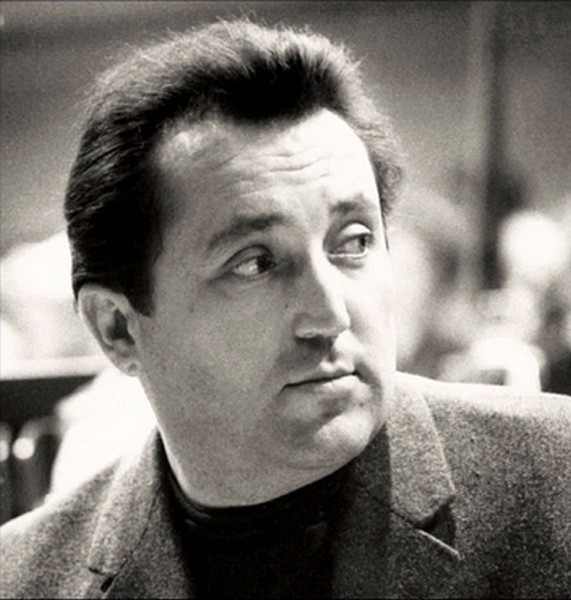
If I'm not wrong (I wish I was, and there were some more recordings that I don't know anything about), there are only seven different Lieder by Strauss, which Wunderlich sang. The only good thing about it is that we can go over the complete list on this post:
- The first recording is from November 1962, with Rolf Reinhardt as a piano accompanist. There are only three Lieder: Heimliche Aufforderung, Wie sollten wir geheim sie halten and Zueignung.
- The second recording is from the same year, 1962, in December, with the Bavarian Radio Symphony Orchestra conducted by Jan Koetsier. All in all, there are five songs: Heimliche Aufforderung and Zueignung again and three new ones: Ich trage meine Minne, Ständchen and Morgen.
- There isn’t any other Strauss's song until the Edinburgh’s recital in 1966, Wunderlich's last one; he sang Ich trage meine Minne as an encore.
- There are three more Lieder included in a very special recording, Wunderlich Privat. This disc is a compilation of home-made recordings that the tenor made himself using a tape recorder; of course the quality is not as good as we are used to, but the songs have that warmth and spontaneity which make them unique. You can even hear the voice of a little girl in the background, probably Wunderlich's daughter, or some swear words when things don’t go his way. We owe the release of this recording to his widow, who collected seventeen pieces registered between 1962 and 1966, among them Ich trage meine Minne, Ständchen, and a Lied never heard before: Cäcilie.
We're listening to Ständchen (Serenade), written by Strauss in 1886. It belongs to the Sechs Lieder von Adolf Friedrich Graf von Schack, Op. 17, and it's the only one well-known. As it corresponds to a serenade, the singer tries to seduce his beloved and make her go to the garden, a garden like those in fairy tales, quietly, with light steps like those of elves when walking from flower to flower. And we can hear the playful steps on the piano, probably one of the best accompaniments by Strauss.
In 1900, the conductor Felix Mottl, author of the most performed orchestration of the Wesendonck Lieder by Wagner, orchestrated Ständchen. In my opinion the Lied loses its charm with the orchestration, we no longer listen to the elf walking up and down the garden, but as they say, there's no accounting for taste, and Strauss should have been satisfied enough, because he didn't make any opinion against the orchestration.
We have at our disposal both versions, with very different interpretations. We don't know who is accompanying in the piano version, or when it was exactly recorded, and, as I said before, the sound is not good. But it’s full of intimacy and tenderness (the score is marked “vivace e dolce”) and flows as naturally as if singing was the only way to express oneself. The orchestrated version, as usual when an orchestra is behind the singer instead of a piano next to him, is much more expansive; Wunderlich is a extremely persuasive seducer.
Besides its character, there is a significant difference between the two performances. Notice the last verse, the repetition of the words “Hoch glühn”. At the score, every word lasts a measure both times, and that's what we hear at the piano version; but at the orchestrated version the second “hoch”, the highest note in the song, lasts two measures instead of one. This license became a tradition, and can almost always be heard when performing the orchestrated song and often when performing the song with piano. I can imagine one reason to justify that long high note, because tenors and sopranos love them, but, is it really necessary in this song context? Again, we should assume that Strauss liked it, because there is at least one recording with him playing the piano with this long high note.
Here are the two performings by Fritz Wunderlich, I hope you enjoy it!
Mach auf, mach auf! doch leise, mein Kind,
Um Keinen vom Schlummer zu wecken!
Kaum murmelt der Bach, kaum zittert im Wind
Ein Blatt an den Büschen und Hecken;
Drum leise, mein Mädchen, daß nichts sich regt,
Nur leise die Hand auf die Klinke gelegt!
Mit Tritten, wie Tritte der Elfen so sacht,
Um über die Blumen zu hüpfen,
Flieg leicht hinaus in die Mondscheinnacht,
Zu mir in den Garten zu schlüpfen!
Rings schlummern die Blüten am rieselnden Bach
Und duften im Schlaf, nur die Liebe ist wach.
Sitz nieder! Hier dämmerts geheimnisvoll
Unter den Lindenbäumen.
Die Nachtigall uns zu Häupten soll
Von unseren Küssen träumen
Und die Rose, wenn sie am Morgen erwacht,
Hoch glühn von den Wonneschauern der Nacht.
Open up, open, but softly my dear,
So as to wake no one from sleep.
The brook hardly murmers, the wind hardly shakes
A leaf on bush or hedge.
So, softly, my maiden, so that nothing stirs,
Just lay your hand softly on the doorlatch.
With steps as soft as the footsteps of elves,
Soft enough to hop over the flowers,
Fly lightly out into the moonlit night,
To steal to me in the garden.
The flowers are sleeping along the rippling brook,
Fragrant in sleep, only love is awake.
Sit, here it darkens mysteriously
Beneath the lindens,
The nightingale over our heads
Shall dream of our kisses,
And the rose, when it wakes in the morning,
Shall glow from the wondrous passions of the night.
(translation © by Lawrence Snyder and Rebecca Plack - http:www.lieder.net)














Comments powered by CComment